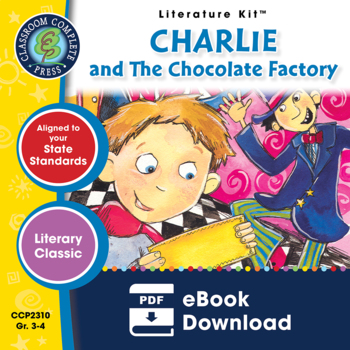Charlie & The Chocolate Factory - Literature Kit Gr. 3-4
- PDF
Also included in
- In this State Standards-aligned Literature Kit™ Set, we combine 3 novel study guides featuring novels written by Roald Dahl. Take a Peak Inside:Each guide divides the novel by chapters or sections and feature reading comprehension and vocabulary questions. In every chapter, we include Before You ReaPrice $29.95Original Price $38.85Save $8.90
Description
A Literature Kit for the novel Charlie & The Chocolate Factory written by Roald Dahl.
Take a Peek Inside:
Understand how to overcome one's poor situation with kindness and a positive attitude. Help students gain a better understanding of the book so they can really enjoy reading it. Test critical and creative thinking skills by conducting a character study of Willy Wonka before even reading about him. Gain a sense of Charlie's hardships with tailored true or false questions. Discuss the pros and cons of having a No-Gum policy at school before getting together for a class debate. Invent your own chocolate bar with a list of ingredients, a slogan and commercial. Create an acrostic poem puzzle for a partner to solve using unique words from the book.
About the Novel:
Who would believe that Charlie Bucket’s life would take such an unusual turn? Charlie and his family are very poor, and food is never in abundance. The world is on a frenzy trying to find one of the five Golden Tickets. By getting one of these tickets, the winner will visit the inside of the mysterious Mr. Wonka’s Chocolate Factory. Charlie finds a dollar bill and buys himself a chocolate bar that contains the last Golden Ticket. Along with four other children, they visit the factory and meet up with the Oompa-Loompas who are the hard workers of the factory. At last, Mr. Wonka tells Charlie that he has won the whole factory, and the brave and true Charlie and his family will never starve again.
Aligned to your State Standards and written to Bloom's Taxonomy, additional crossword, word search, comprehension quiz and answer key are also included.
************************************************************************
View Similar Titles:
► James and the Giant Peach - Literature Kit Gr. 3-4
► Fantastic Mr Fox - Literature Kit Gr. 3-4
► Roald Dahl Lit Kit Set - Gr. 3-4
************************************************************************
Aligned to Common Core
RL.3.1, RL.3.2, RL.3.3, RL.3.4, RL.3.5, RL.3.6, RL.3.7, RL.3.10, RL.4.1, RL.4.2, RL.4.3, RL.4.4, RL.4.6, RL.4.10, RF.3.3, RF.3.4, RF.4.3, RF.4.4, W.3.1, W.3.2, W.3.3, W.3.4, W.3.7, W.3.8, W.4.1, W.4.3, W.4.4, W.4.7, W.4.8, W.4.9
************************************************************************
Check out our sister TPT shops:






